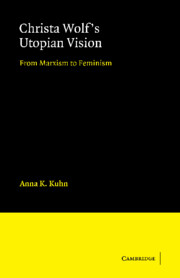Book contents
- Frontmatter
- Contents
- Acknowledgments
- List of abbreviations
- 1 Introduction: setting the context
- 2 Beginnings: experimentation with Socialist Realist paradigms
- 3 Christa T.: the quest for self-actualization
- 4 Patterns of Childhood: the confrontation with the self
- 5 No Place on Earth: revision of the Romantic heritage
- 6 Cassandra: myth, matriarchy, and the canon
- 7 In lieu of a conclusion. Störfall: the destruction of utopia?
- Notes
- Bibliography
- Index
2 - Beginnings: experimentation with Socialist Realist paradigms
Published online by Cambridge University Press: 18 September 2009
- Frontmatter
- Contents
- Acknowledgments
- List of abbreviations
- 1 Introduction: setting the context
- 2 Beginnings: experimentation with Socialist Realist paradigms
- 3 Christa T.: the quest for self-actualization
- 4 Patterns of Childhood: the confrontation with the self
- 5 No Place on Earth: revision of the Romantic heritage
- 6 Cassandra: myth, matriarchy, and the canon
- 7 In lieu of a conclusion. Störfall: the destruction of utopia?
- Notes
- Bibliography
- Index
Summary
Moscow Novella
Christa Wolf's literary beginnings were not auspicious. The handful of politely encouraging reviews that greeted her first endeavor, Moscow Novella (1961) did not encourage wide translation of this work, so it is not available in English. Wolf herself agrees with the critical consensus that Moscow Novella is aesthetically inferior to her later works. The naive, idealistic faith in socialism that determined the evaluative criteria of Wolf's literary reviews also stamped her first work of imaginative literature with an uncharacteristically evangelical tone.
By her own account, Christa Wolf's initial encounter with Marxist thought was an epiphany: nineteen years old, horrified by the postwar revelations concerning the Nazi regime, she enthusiastically embraced Marx's humanistic social vision. Convinced that socialism offered the means of revolutionizing social relations, Wolf at first failed to distinguish between theory and praxis and accepted Party dogma uncritically. Her programmatic application of GDR cultural policy, reflected in her work as critic and editor for the publishing house “Neues Leben” and for the literary journal Neue Deutsche Literatur, carried over to her own creative writing.
Wolf's study of German literature had familiarized her with the prevailing Socialist Realist aesthetic. Her position as an editor of one of the leading GDR journals guaranteed that her (published) opinions and taste would not deviate greatly from official cultural policy.
- Type
- Chapter
- Information
- Christa Wolf's Utopian VisionFrom Marxism to Feminism, pp. 20 - 50Publisher: Cambridge University PressPrint publication year: 1988



